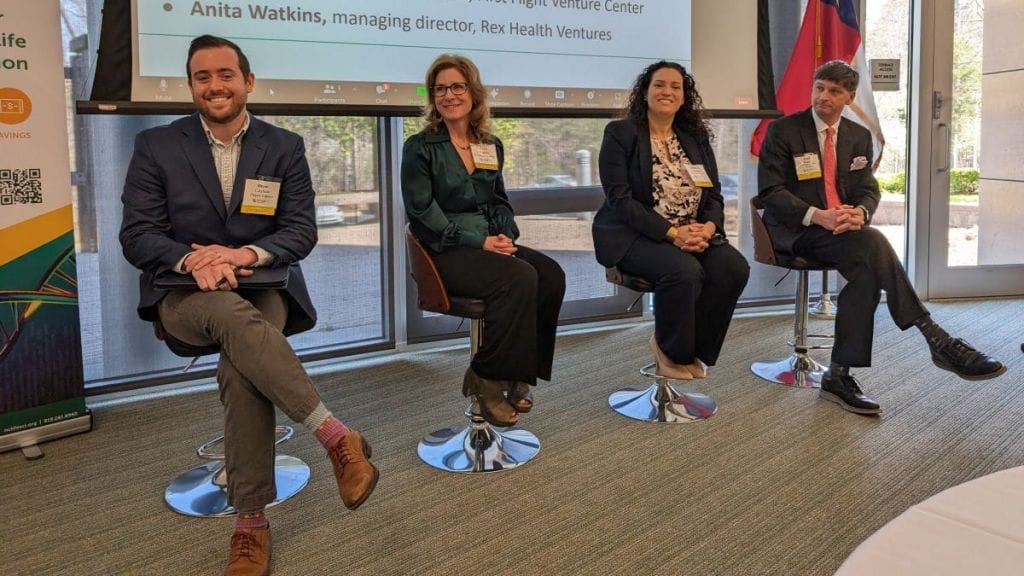NCLifeSci forum explores options for accessing capital

Panelists for the NCLifeSci Emerging Company and Technology Forum discussed early-stage life science companies' access to capital and incubation and emphasized the importance of building a network, leveraging the resources of your local ecosystem resources and connecting with potential investors before raising money.
The forum focusing on access to capital was held at the NC Biotechnology Center on Thursday, March 14, and was moderated by Drew Cutshaw, senior associate and medical officer at Pappas Capital.
The event was sponsored by RESI South, SmaBio Labs, TriNet and Wyrick Robbins.
The panelists were
- Johanna Grossman, head of health care and life sciences, capital markets, New York Stock Exchange;
- Eric Heil, managing partner, Medical Excellence Capital;
- Emil Runge, director of programs, First Flight Venture Center; and
- Anita Watkins, managing director, Rex Health Ventures.
Overview
The panel discussed early-stage life science companies' access to capital and incubation and emphasized the importance of building a network and leveraging local ecosystem resources. Companies should start connecting with potential investors and building relationships before raising money. To attract investors, companies should focus on generating evidence of proof of function for their products.
The panelists also discussed current trends in life sciences investment and mergers and acquisitions, with some expressing optimism about the future of biotech IPOs. Finally, the panel talked about the importance of preparation and timing when it comes to going public, highlighting the need for companies to prepare themselves, their investors and their timeline several months to a year in advance.
From the panelists
Watkins said that investors are seeing improved deal flow and valuations in 2023, with a focus on follow-on rounds and a pickup in mergers and acquisitions. She said that while her fund did not enter into any new deals in 2023, she expected 2024 to be more active.
“While deal volume might have been down in ‘23, the fund-raising amongst funds has been very, very high,” she said. “So there's a lot of dry powder sitting there, a lot of investors like us really eager and looking for the appropriate deals to put money to work.”
Grossman agreed, saying Big Pharma has half a trillion dollars ready to spend.
Heil said the venture ecosystem is ripe for disruption with pressure on firms to drive returns and justify future funds.
“I think so many funds got really big fast in ‘21, ‘22 and are going to really struggle generating the three, four or five times returns on one, two and $3 billion fund sizes over the next 12 to 24 months,” he said.
Heil said there is a need for more M&A and public market exits to drive more liquidity into the ecosystem.
Runge recommended that early-stage companies leverage the RTP ecosystem for help and support. He highlighted the resources available at First Flight Venture Center, including affordable offices and labs, pitch practice sessions, science talks, early-stage accelerators and nondilutive funding opportunities. He also pointed to NCBiotech as a source on nondilutive funding through its grants and loans program.
The panel agreed that investors prioritize established relationships and want functional proofs of concept when choosing where to invest.
“Start reaching out and connecting before you're even raising money,” Heil said. “It's a relationship game. We will make an investment, and we're going to be together for over seven years, most likely.”
Ask potential investors about the data they want to see for them to take a good look at your proposal, he said.
“From our perspective, most of the time it’s a development candidate already established with some good, in vivo, functional proofs of concept that what you're working one is actually doing what you’re saying it’s doing,” Heil said.
The panel agreed that external validation is very important for early-stage companies, particularly in the form of peer-reviewed articles and credible scientific advisers.
